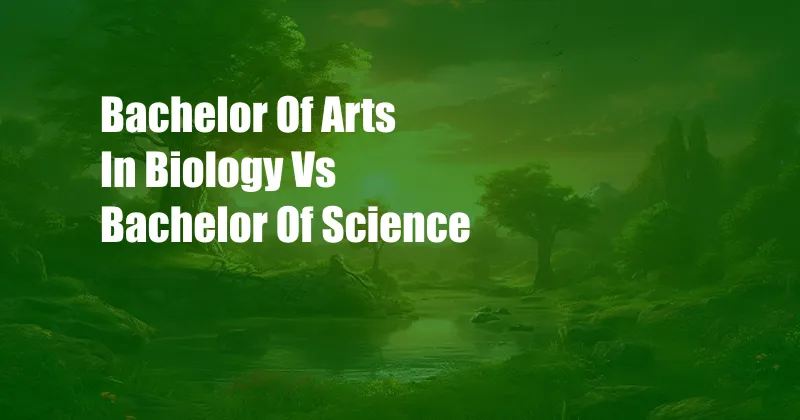
Bachelor of Arts in Biology vs. Bachelor of Science: Unveiling the Differences
Introduction
Embarking on a journey to delve into the captivating world of biology, aspiring students often encounter a pivotal decision: choosing between a Bachelor of Arts (BA) and a Bachelor of Science (BS) degree. While both paths lead to an understanding of biological principles, each program caters to specific career aspirations and academic interests. Let’s delve into the intricacies of these two degrees to help you navigate this choice.
Core Differences: BA vs. BS
Bachelor of Arts (BA)
A Bachelor of Arts in Biology combines a strong foundation in biology with a broad range of liberal arts courses, including humanities, social sciences, and arts. It fosters a holistic approach to biology, emphasizing critical thinking, communication, and analytical skills. BA graduates are well-equipped for careers in education, healthcare administration, or policy and advocacy.
Bachelor of Science (BS)
On the other hand, a Bachelor of Science in Biology provides a more in-depth scientific education, emphasizing laboratory-based research and quantitative analysis. Students study a wide variety of scientific disciplines, including chemistry, physics, and mathematics. BS graduates are prepared for careers in research, academia, biotechnology, or pharmaceuticals.
Curriculum and Coursework
BA Curriculum
- Core Biology Courses: Cell biology, genetics, evolution, ecology
- Liberal Arts Courses: Literature, history, economics, foreign language
- Elective Courses: Open to students’ interests and career goals
BS Curriculum
- Core Biology Courses: Advanced cell biology, molecular biology, biochemistry, physiology
- Science and Math Courses: Chemistry, physics, calculus, statistics
- Research Project: Capstone experience involving original research
Career Opportunities
BA Career Paths
- Science Teacher
- Healthcare Administrator
- Environmental Policy Analyst
- Science Writer
- Museum Educator
BS Career Paths
- Research Scientist
- Laboratory Technician
- Pharmacologist
- Biotechnologist
- Medical Doctor
The Latest Trends and Developments
The field of biology is constantly evolving, and both BA and BS programs are adapting to meet the needs of the changing workforce.
- Increased emphasis on interdisciplinary research: Biology is increasingly interwoven with other fields, such as computer science and engineering. BA and BS programs are offering courses that blend biology with these disciplines.
- Growth in biotechnology and medical research: The demand for skilled biologists in these industries is on the rise. BS programs are emphasizing hands-on laboratory experiences and cutting-edge research opportunities.
- Focus on sustainability: The environmental crisis has sparked a growing need for biologists who can address challenges related to conservation and sustainability. BA programs are offering courses in environmental science and policy.
Expert Advice for Navigating the Choice
- Consider your career goals: If you aspire to a career in research or a scientific field, a BS degree is a better fit. If you are interested in teaching, healthcare administration, or a broader liberal arts education, a BA degree is a viable option.
- Explore the curriculum: Carefully review the course offerings of both programs to ensure that they align with your interests and aspirations.
- Seek mentorship: Reach out to professors or advisors in both departments to gain insights into the nature of each degree and the career paths they can lead to.
Frequently Asked Questions
Q: Is a BA or BS degree better for medical school?
A: Most medical schools require applicants to have a BS degree in biology or a closely related field.
Q: Can I switch between a BA and BS program?
A: It is possible, but it may require additional coursework or adjustments to your schedule.
Q: What is the job outlook for biology graduates?
A: The job outlook for biologists is expected to grow in the coming years, especially in fields related to healthcare, biotechnology, and environmental science.
Conclusion
Your decision between a Bachelor of Arts in Biology and a Bachelor of Science in Biology ultimately rests on your individual aspirations and career goals. Both paths offer a solid foundation in biology, but they differ in their emphasis on liberal arts and scientific research. By carefully considering the coursework, career opportunities, and expert advice presented in this article, you can make an informed choice that sets you on the path to success.
Call to Action
If you have any questions or require further clarification on the topic, feel free to reach out and engage with us. Your feedback and insights are invaluable in shaping our understanding of the topic and providing the best possible resources for our readers.